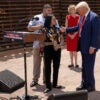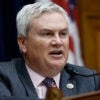Sixty-seven years ago yesterday, the U.S. Senate ratified the North Atlantic Treaty, creating NATO. Ravaged by two world wars, and faced with the very real existential threat of the Soviet Union, European democracies allied with the U.S. and Canada created a security pact with collective defense at its core.
The United States lost over half a million soldiers combined in World War I and World War II and recognized that its national interest resided in fostering a secure and peaceful Europe.
Today, the Cold War may be over, but the NATO alliance is as indispensable as ever before. An aggressive, revanchist Russia has demonstrated a willingness to change established legal borders through invasion, flaunted international agreements, and sought to dominate its neighbors through intimidation and force.
Successive presidents have made the mistake of believing Russian President Vladimir Putin would be an honest partner for the U.S. The Obama administration’s disastrous 2009 “reset” policy with Russia only served to wet the Kremlin’s appetite for greater regional conquest and concessions from the West. The next administration should be sure not to make this same mistake again.
NATO has formed the backbone of security and stability in Europe; stability that has served U.S. interests well. Economically, a secure Europe has allowed prosperity to flourish. European nations are today the largest trading partner for the U.S. and European investment accounts for almost 70 percent of foreign investment in the U.S.
U.S. bases in Europe provide significant benefits as well. A permanent presence in Europe ensures the U.S. can live up to its treaty obligations to help defend its NATO allies should their territorial integrity be infringed upon. In addition, being nearer to global hot spots in the Middle East allows U.S. policymakers more numerous and timely options for responding to incidents in the region. For example, Morón Air Base in Spain hosts a U.S. rapid reaction force that can respond quickly to unfolding events in North Africa and the Middle East.
Finally, our allies in Europe share common values with the U.S., democracy, free markets, the rule of law, and respect for the rights of the governed. The oldest and closest allies of our nation are there. When the U.S. has sought friends to help shoulder the burden in places like Afghanistan and Iraq, it is overwhelmingly our NATO allies who have answered the call.
Since its creation in 1949, NATO has done more to promote democracy, peace, and security in Europe than any other multilateral organization, including the European Union. Disengaging from NATO would be a mistake of historic proportions. In light of Russia’s continued aggression against neighboring states, the threat it poses to our allies in Europe, and its desire to undermine U.S. national interests across the globe, the next administration would do well to bolster U.S. commitment to our partners, not disengage.
At the Warsaw summit a few short weeks ago, the 28 (and soon to be 29) members of NATO took important steps to address the threat emanating from Russia. Rather than turn away from our allies, the U.S. should take this pivotal moment to enact policies that recommit to collective defense.
The statesman Edmund Burke once stated, “Those who don’t know history are doomed to repeat it.” The NATO alliance has served as the bedrock for peace, security, and prosperity on both sides of the Atlantic for nearly seven decades. It is a peace and stability that has enormously benefited the United States and that will continue to do so. NATO’s continuing role as the guardian of trans-Atlantic security is a lesson the next U.S. president must take to heart.































